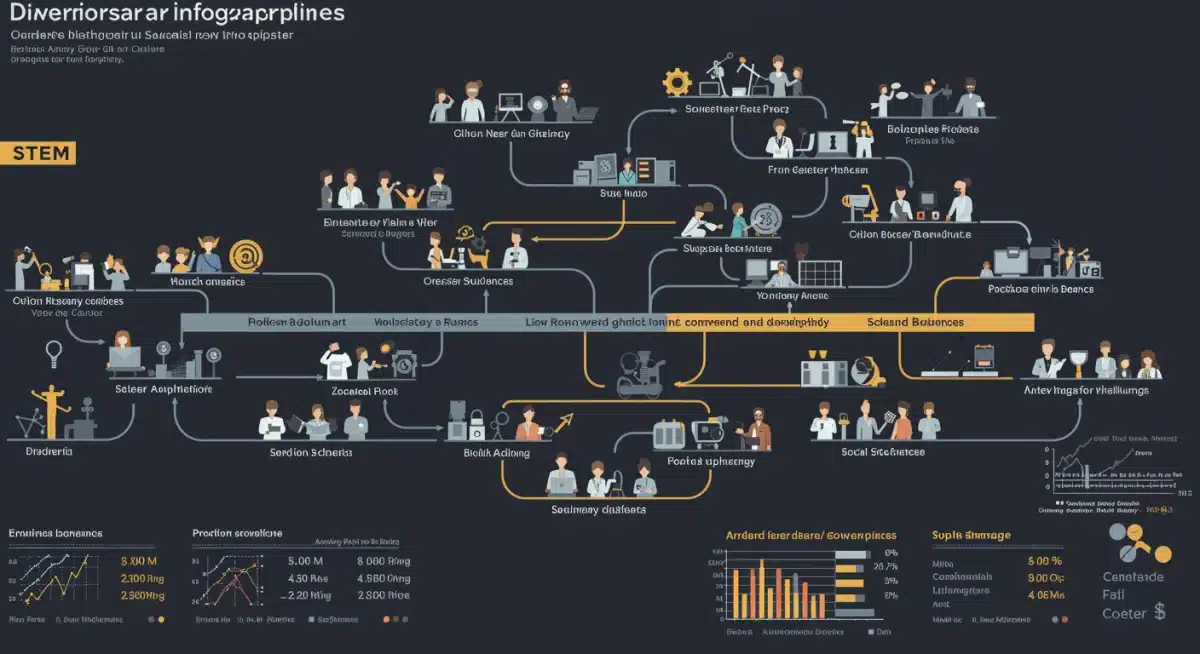Maximize Your Educational ROI: Degree Strategies 2025

Choosing the right degree program in 2025 is crucial for maximizing educational ROI, with strategic decisions potentially leading to a 15% higher earning potential and a more impactful career path.
Navigating the complex landscape of higher education to ensure a significant return on investment is more critical than ever. This article delves into educational ROI strategies for choosing a degree program in 2025, offering insights that could lead to a 15% higher earning potential and a more fulfilling career.
Understanding Educational ROI in 2025
Educational Return on Investment (ROI) is not merely about the financial gains from a degree but encompasses the broader value a program provides, including career satisfaction, skill development, and future opportunities. In 2025, with rapid technological advancements and evolving job markets, understanding this metric is paramount for prospective students.
The shifting landscape of higher education
The traditional view of a college degree as an automatic pathway to success is evolving. Today, students must be strategic, considering not just the prestige of an institution but the tangible skills and networking opportunities a program offers.
- Focus on future-proof skills like AI literacy and data analytics.
- Prioritize programs with strong industry connections and internship placements.
- Evaluate the alumni network for mentorship and career advancement.
The goal is to select a program that aligns with emerging industry demands, ensuring that the investment of time and money translates into a competitive edge in the job market. This forward-thinking approach is key to maximizing your educational investment.
Understanding educational ROI requires a comprehensive look at both direct costs and potential benefits. It’s about making an informed decision that balances passion with practicality, ultimately leading to a more prosperous and satisfying professional life.
Identifying High-Demand Fields and Future-Proof Skills
To truly maximize your educational ROI, it’s essential to align your degree choice with fields experiencing significant growth and demand. The job market of 2025 and beyond will continue to be shaped by technological innovation and global challenges, creating new opportunities and transforming existing ones.
Emerging industries and career opportunities
Certain sectors are projected to grow substantially, offering lucrative career paths and a higher likelihood of strong earning potential. These include areas driven by technological shifts and societal needs.
- Artificial Intelligence and Machine Learning: Roles in AI development, data science, and machine learning engineering are experiencing explosive growth.
- Cybersecurity: With increasing digital threats, cybersecurity analysts and engineers are in high demand across all industries.
- Renewable Energy: As the world transitions to sustainable energy, careers in renewable energy engineering, policy, and management are expanding.
- Healthcare Technology: The intersection of healthcare and technology, including bioinformatics and health informatics, offers innovative career prospects.
Beyond specific industries, certain skills are becoming universally valuable. These are the future-proof skills that will enhance your adaptability and competitiveness regardless of your chosen field.
Crucial skills for tomorrow’s workforce
Developing a robust skill set that combines technical prowess with critical soft skills is non-negotiable. These capabilities will ensure you remain relevant and indispensable in a rapidly changing professional landscape.
Analytical thinking, problem-solving, and creativity are foundational. The ability to interpret complex data, innovate solutions, and think outside the box will set you apart. Furthermore, strong communication and collaboration skills are vital for navigating diverse teams and global projects.
Continuous learning and adaptability are perhaps the most important skills. The willingness to acquire new knowledge and adjust to evolving technologies and methodologies is crucial for long-term career success. Choosing a degree that fosters these skills will significantly enhance your return on investment.
Evaluating Program Accreditation and Reputation
The credibility and quality of your degree program play a pivotal role in its perceived value and, consequently, your earning potential. Proper accreditation ensures that a program meets rigorous academic standards, while a strong institutional reputation can open doors to better job opportunities and networking connections.
The importance of accreditation
Accreditation is a stamp of approval from an independent body, indicating that an educational institution or program has met certain quality benchmarks. This is not just a formality; it directly impacts the transferability of credits, eligibility for financial aid, and employer recognition.
Always verify that the institution and the specific program you are considering are accredited by recognized agencies. For example, in the United States, regional accreditation is generally preferred for broader recognition. Unaccredited programs might be cheaper, but their degrees often hold little value in the job market, diminishing your educational ROI significantly.
Institutional reputation and employer perception
While accreditation ensures quality, the reputation of the institution provides an additional layer of advantage. Universities with strong academic standing, renowned faculty, and successful alumni networks often attract top employers and provide richer resources.
Research the institution’s standing in its field, its graduate employment rates, and the average starting salaries of its alumni. A highly reputable program can give you a significant edge in competitive job markets, potentially contributing to that 15% higher earning potential. Look for programs that consistently rank well in your chosen discipline and have strong ties to relevant industries.

Ultimately, a combination of proper accreditation and a solid institutional reputation will provide a robust foundation for your educational investment, ensuring that your degree is respected and valued by future employers.
Financial Aid and Debt Management Strategies
The cost of higher education is a significant factor in educational ROI. Strategic planning for financial aid and effective debt management are crucial to ensure that the investment pays off without becoming an overwhelming burden. Minimizing student loan debt directly impacts your net earning potential post-graduation.
Exploring diverse financial aid options
Many students overlook the vast array of financial aid available beyond federal loans. Scholarships and grants, unlike loans, do not need to be repaid and can significantly reduce your overall educational cost.
- Merit-based scholarships: Awarded for academic achievement, talent, or specific skills.
- Need-based grants: Provided based on financial need, often from federal or state governments, or institutions.
- Employer tuition assistance: Some companies offer to pay for employees’ education, especially if it aligns with career development.
- Apprenticeships and co-op programs: These can provide paid work experience while you study, offsetting educational costs.
It is crucial to start your financial aid research early and apply for as many opportunities as possible. Every dollar received in scholarships or grants is a dollar you don’t have to borrow, directly improving your educational ROI.
Smart loan management and repayment plans
If loans are necessary, understanding how to manage them effectively is vital. Federal student loans often come with more favorable terms than private loans, including fixed interest rates and income-driven repayment options.
Consider consolidating your loans if it simplifies repayment, and always explore repayment plans that align with your projected post-graduation income. Aggressively paying down high-interest loans when possible can save you thousands of dollars over the life of the loan. A proactive approach to debt management ensures that your degree remains a valuable asset rather than a financial liability.
Networking and Experiential Learning Opportunities
A degree alone is often not enough; the experiences and connections you gain during your educational journey are equally, if not more, valuable. Actively pursuing networking and experiential learning opportunities can significantly enhance your educational ROI by providing practical skills, industry insights, and career pathways.
Building professional connections
Your university years are an ideal time to build a robust professional network. These connections can lead to mentorship, internships, and even your first job out of college. Networking extends beyond formal events; it includes building relationships with professors, alumni, and guest speakers.
Engage in campus organizations, attend career fairs, and utilize LinkedIn to connect with professionals in your desired field. These relationships can provide invaluable advice, open doors to hidden job markets, and offer insights that classroom learning alone cannot. A strong network is a powerful asset in accelerating career growth and securing that higher earning potential.
The power of internships and co-ops
Experiential learning, particularly through internships and co-op programs, is critical for bridging the gap between academic theory and real-world application. These opportunities provide hands-on experience, allowing you to apply classroom knowledge, develop new skills, and explore different career paths before committing to one.
- Gain practical experience in your chosen field.
- Develop a professional resume and portfolio.
- Build a network of industry contacts.
- Potentially secure a full-time job offer upon graduation.
Many internships are paid, providing financial relief while you gain valuable experience. Even unpaid internships can offer significant returns in terms of career opportunities and skill development. Prioritize programs that emphasize or require such practical experiences, as they are crucial for maximizing your educational ROI.
Strategic Career Planning and Continuous Learning
Maximizing your educational ROI extends far beyond graduation. It involves a lifelong commitment to strategic career planning and continuous learning, ensuring that your initial investment continues to yield returns throughout your professional life. The rapidly evolving job market demands constant adaptation and skill refinement.
Developing a long-term career roadmap
A well-defined career roadmap helps you to set clear objectives and identify the steps needed to achieve them. This involves regularly assessing your skills, interests, and market demands, and being prepared to pivot if necessary. Consider what your ideal career trajectory looks like in 5, 10, and 20 years.
This planning should not be rigid but rather a flexible guide that allows for adjustments based on new opportunities or changing personal circumstances. Utilize career services offered by your university, and seek guidance from mentors and industry professionals to refine your path. Proactive planning helps you stay ahead of trends and positions you for continuous growth.
Embracing lifelong learning and upskilling
The concept of a static career is outdated. To maintain and enhance your earning potential, continuous learning and upskilling are indispensable. This doesn’t necessarily mean pursuing another full degree; it could involve certifications, online courses, workshops, or professional development programs.
Focus on acquiring new skills that are in demand or that complement your existing expertise. For instance, if you’re in marketing, learning data analytics or advanced digital advertising techniques can significantly boost your value. Lifelong learning ensures you remain competitive, adaptable, and relevant in any industry, making your initial educational investment perpetually valuable.
| Key Strategy | Brief Description |
|---|---|
| High-Demand Fields | Choose degrees in growing sectors like AI, cybersecurity, and renewable energy for better job prospects. |
| Accreditation & Reputation | Verify program accreditation and institutional standing to ensure degree credibility and employer recognition. |
| Financial Aid Management | Maximize scholarships/grants and manage loans wisely to reduce debt and improve net ROI. |
| Networking & Experience | Actively pursue internships and build professional connections for practical skills and career opportunities. |
Frequently asked questions
Educational ROI refers to the overall value you get from your investment in a degree program. It considers not just financial returns, like higher salaries, but also career satisfaction, skill development, and future opportunities that arise from your chosen education.
Research labor market reports from reputable sources like the Bureau of Labor Statistics (BLS). Look for sectors driven by technology, sustainability, and healthcare innovation. Fields such as AI, cybersecurity, renewable energy, and health tech are projected to show strong growth and demand.
Yes, absolutely. Accreditation ensures a program meets quality standards, making your credits transferable and your degree recognized by employers and for further education. Choosing an unaccredited program can significantly devalue your investment and limit future opportunities.
Prioritize scholarships and grants to minimize borrowing. If loans are necessary, favor federal loans over private ones due to better terms. Explore income-driven repayment plans and consider consolidating loans. Proactive repayment, especially of high-interest loans, saves money in the long run.
Internships provide practical experience, allowing you to apply classroom knowledge and develop in-demand skills. They build your professional network, enhance your resume, and often lead to full-time job offers upon graduation, directly contributing to a higher starting salary and career growth.
Conclusion
Maximizing your educational ROI in 2025 demands a strategic and forward-thinking approach. By carefully considering high-demand fields, ensuring program credibility, managing finances wisely, and actively engaging in networking and experiential learning, students can significantly enhance their earning potential and career satisfaction. The journey through higher education is an investment in your future, and with these insider strategies, you are better equipped to make choices that yield lasting and meaningful returns.





